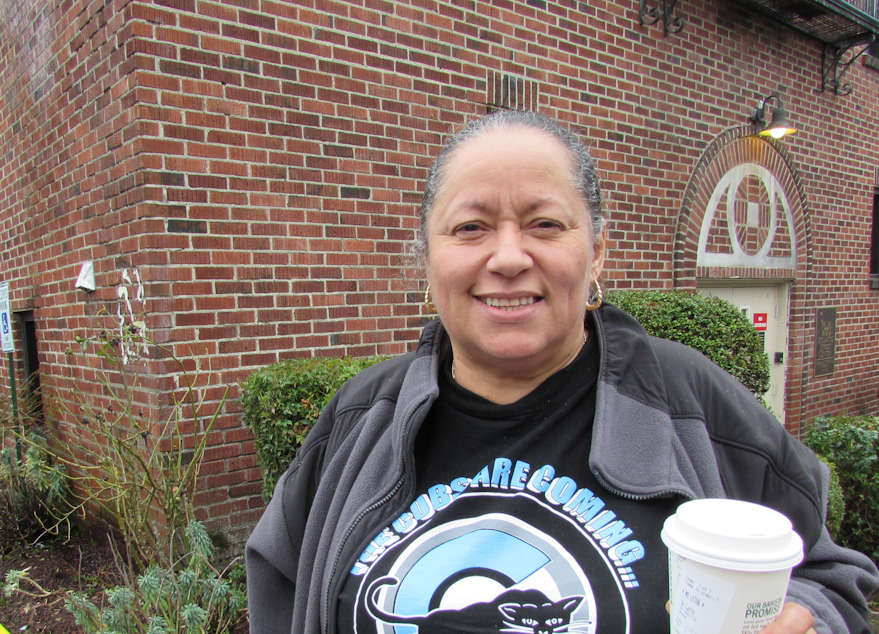Not just pot cases: Seattle to lift burdens of low-level convictions

When Liletha Williams goes to buy coffee on Rainier Avenue in Seattle, she seems to know everyone: She’s a longtime community advocate. But when she fills out a job application, there’s something else she has to mention.
“Three misdemeanor thefts from probably a six-month period when I was active in my crack addiction,” she said.
That was 30 years ago. But she said that just a few months back, she was denied a job working with teens like her when she was young.
“They still said my criminal history," she said. "They just couldn’t work with me.”
Williams said she’s a homeowner now, and her grown children are young professionals. She was stunned that her record still appears to be an issue.
“It really hurt my feelings that they valued the time I was a drug-addicted prostitute over the fact that I’ve gone to college, got a couple degrees, that I’ve done 30 years to change my life," she said. "All my efforts didn’t matter more than the bad I had done.”
Sponsored
Seattle officials said they want to prevent old misdemeanors from casting shadows like that.
This week the Seattle Municipal Court started vacating up to 542 convictions for marijuana possession from 1996 to 2010 — before pot was legalized under Washington law. The action doesn't erase the person's record, but it means background checks for criminal convictions will come back clean.
This effort is part of a larger push to keep low-level crimes from holding people back.
Seattle officials also want to quash the warrants in 208 older cases for crimes like prostitution and driving with a suspended license.
Kelly Harris heads the criminal division in the Seattle City Attorney's office. “We’re just in the first step right now,” he said.
Sponsored
Harris's office has asked the Seattle Municipal Court to quash the warrants for people who missed a hearing or didn't make a final payment to the court.
These convictions won’t necessarily be dismissed, he said. But quashing the warrant means people don’t have to fear every police encounter.
“It’s just making sure the person won’t be arrested and have to spend needless time in jail for a case they can deal with outside of being in custody,” he said.
Harris said if the court approves this motion, they will seek to quash warrants on hundreds of other low-level cases.
“Property crimes are pretty much fair game for us to examine to see if those are appropriate for quashing," he said.
But it's not automatic: The court will review each person’s criminal history before granting these requests. Harris said the city will not seek a more lenient approach for other misdemeanors like driving under the influence and domestic violence convictions.
Josh Sattler, chief clerk for the Seattle Municipal Court, said the court is also trying to prevent people from getting entangled in the justice system over unpaid tickets and license suspensions.
Sponsored
“Come in and address it: We do have payment plans, we do have community service options,” he said.
The municipal court holds neighborhood events, nicknamed “court in a bag,” where people can check on any outstanding warrants, and resolve violations without fear of arrest. Sattler said at their first event, one woman went public with her relief that she just had to pay a speeding ticket.
“She actually pulled her cell phone out and went on Facebook Live and said, ‘Hey everybody look, it’s not a scam, I’m not getting arrested!’”
Sattler said the crowds were small when they started these events, but the most recent one in Delridge drew nearly 400 people. He said that could reflect gains in public trust – or just the lower barriers presented by visiting a community center rather than the downtown courthouse.
Jacqueline Helfgott heads the Crime & Justice Research Center at Seattle University. She said her studies of misdemeanors reveal the “colossal" impact they have on people’s lives, but also Seattle's innovative approach to reducing them. Helfgott said re-examining old cases is a good thing, but preventing new ones should be the goal.
Sponsored
“The first and the broadest and the largest [priority] is to reduce the ways in which people enter the system,” she said.
That’s why marijuana legalization is so significant, she said. In other cities she studies, “arrests for marijuana are a big part of their misdemeanor data. And we just don’t have that in Seattle, so that cuts out a huge chunk.”
Helfgott said preventing arrests in the first place is key to reducing the racial inequities in the system as well. Forty percent of the 208 warrants Seattle is seeking to quash were issued to people of color.
Liletha Williams said prosecuting what she calls “survival” crimes, rather than violent crimes, is a waste of money and human potential.
“They’re missing out on a whole group of people that could really make a difference,” she said.




